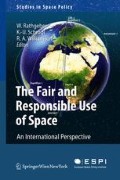Abstract
While questions regarding the future security of space often pit military uses against civilian — or “peaceful” — uses, reality is much more complicated. The world has benefited both from the militarisation of space and from progress in civil and commercial uses. Put simply, the use of space provides military (and thus security), economic and societal benefits.
Access this chapter
Tax calculation will be finalised at checkout
Purchases are for personal use only
Preview
Unable to display preview. Download preview PDF.
References
Kaufman, Richard, Hertzfeld, Henry, and Jeffrey Lewis. Space, Security and the Economy. Washington, D.C.: Economists for Peace & Security, September 2008: 4.
Space Foundation. The Space Report 2009. Colorado Springs, CO: Space Foundation, 2009: 6.
Kaufman, Richard, Hertzfeld, Henry, and Jeffrey Lewis. Space, Security and the Economy. Washington, D.C.: Economists for Peace & Security, September 2008: 8.
Federal Aviation Administration. The Economic Impact of Commercial Space Transportation on the US Economy. Washington, D.C.: FAA. April 2008: 1.
Amnesty International website. Eyes on Darfur. 4 Nov. 2009. http://www.eyesondarfur.org/satellite. html.
Atkinson, Nancy. “Space Debris Illustrated: The Problem in Pictures.” 11 April 2008. Universe Today. 4 Nov. 2009. http://www.universetoday.com/2008/04/11/space-debris-illustrated-the-problem-in-pictures.
Lepisto, Christine. “Shocking Space Debris Images.” 20 April 2008. Treehugger. 4 Nov. 2009. http://www.treehugger.com/files/2008/04/shocking-space-debris-images.php.
Secure World Foundation website. International Traffic in Arms Regulations (ITAR) Factsheet. Last updated September 2008. 4 Nov. 2009. http://www.secureworldfoundation.org/siteadmin/ images/files/file_229.pdfm.
Kuslolek, Richard. “ITAR Dilemma: Finding the Balance Between Regulation And Profit” 1 July 2008. Satellite Today. http://www.satellitetoday.com/military/homelandsecurity/23649.html.
Brown, Peter J. “Engaging China in Space Part 2: US Firms Tired of Being Shut Out.” 4 Dec. 2008. Asia Times. 4 Nov. 2009. http://www.atimes.com/atimes/China/JL04Ad01.html.
Wright, David. “Space Debris.” Physics Today 60.10: 35–40.
Cáceres, Marco. “Market Impact Brief: China’s ASAT Weapons Test.” January 2007. Teal Group Corp. Arlington, VA.
“Germany Commissions First Spy Satellite”, 4 Dec. 2008. Deutsche Welle DW-World. 4 Nov. 2009. http://www.dw-world.de/dw/article/0,,3849862,00.html.
Shalal-Esa, Andrea. “U.S. Approves Plan for 2 Commercial Image Satellites.” 10 Sept. 2008. Reuters. 4 Nov. 2009. http://www.reuters.com/article/reutersEdge/idUSN1045748920080910.
Gardener, David W. “Congress Cuts BASIC Satellite Imaging Program.” 21 Oct. 2008. Information Week. http://www.informationweek.com/news/showArticle.jhtml?articleID=211300121.
Eisler, Peter. “Global Security: The Sky’s Unblinking Eyes.” 9 Nov. 2008. USA Today. 4 Nov. 2009. http://www.technewsworld.com/story/65090.html?wlc=1229102384.
NASA. NESC Review of Demonstration of Autonomous Rendezvous Technology (DART) Mission Mishap Investigation Board Review (MIB). NASA Engineering and Safety Center Report: Demonstration of Autonomous Rendezvous Technology Mishap Review Board. Doc. No. RP-06-119, Version 1.0. December 2006: 31.
Berger, Brian and Peter B. de Selding. “ITAR Complicates Preparations for New Station Supply Vehicle.” Space News 11 Apr. 2007.
Lakdawalla, Emily. “A Backlog of 400 Emails: ESA and NASA; MGSFailure; Iapetus; Saturn’s D Ring.” 25 July 2007. The Planetary Society Blog, The Planetary Society. 4 Nov. 2009. http://www. planetary.org/blog/article/00001044/.
Assembly of the Western European Union. Weapons in Space. Fifty-Second Session. Document A/ 1932 of 21 June 2006. Paris: WEU: 7.
Kaufman, Richard, Hertzfeld, Henry, and Jeffrey Lewis. Space, Security and the Economy. Washington, D.C.: Economists for Peace & Security, September 2008: 10–16.
Editor information
Rights and permissions
Copyright information
© 2010 Springer-Verlag/Wien
About this chapter
Cite this chapter
Hitchens, T. (2010). Peaceful uses of outer space vs. militarisation: a cost-benefit analysis. In: Rathgeber, W., Schrogl, KU., Williamson, R.A. (eds) The Fair and Responsible Use of Space. Studies in Space Policy, vol 4. Springer, Vienna. https://doi.org/10.1007/978-3-211-99653-9_5
Download citation
DOI: https://doi.org/10.1007/978-3-211-99653-9_5
Publisher Name: Springer, Vienna
Print ISBN: 978-3-211-99652-2
Online ISBN: 978-3-211-99653-9
eBook Packages: EngineeringEngineering (R0)

